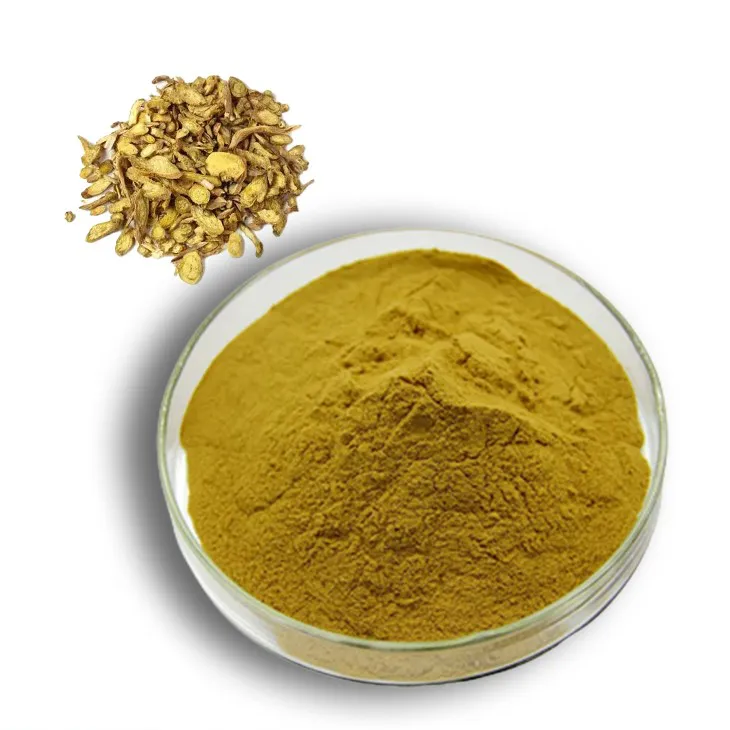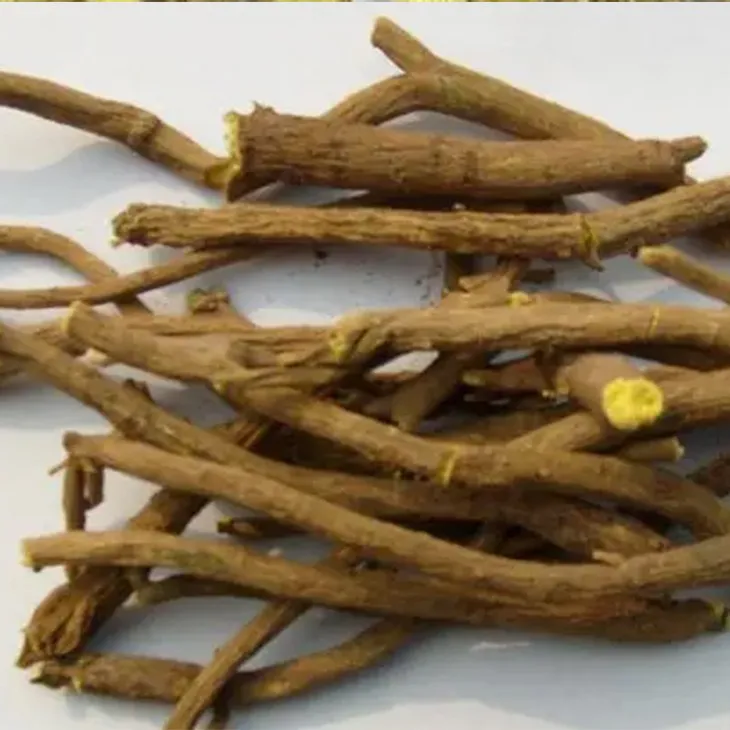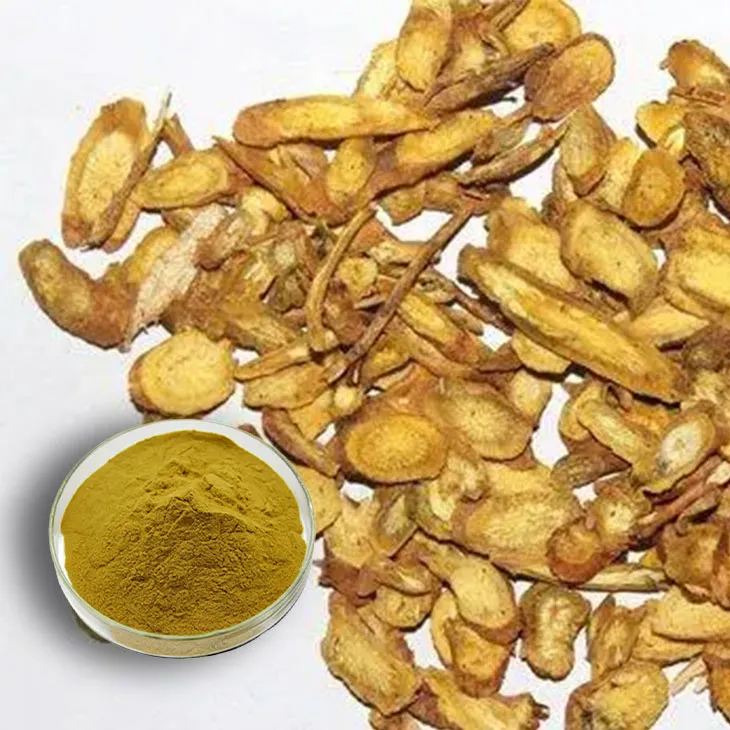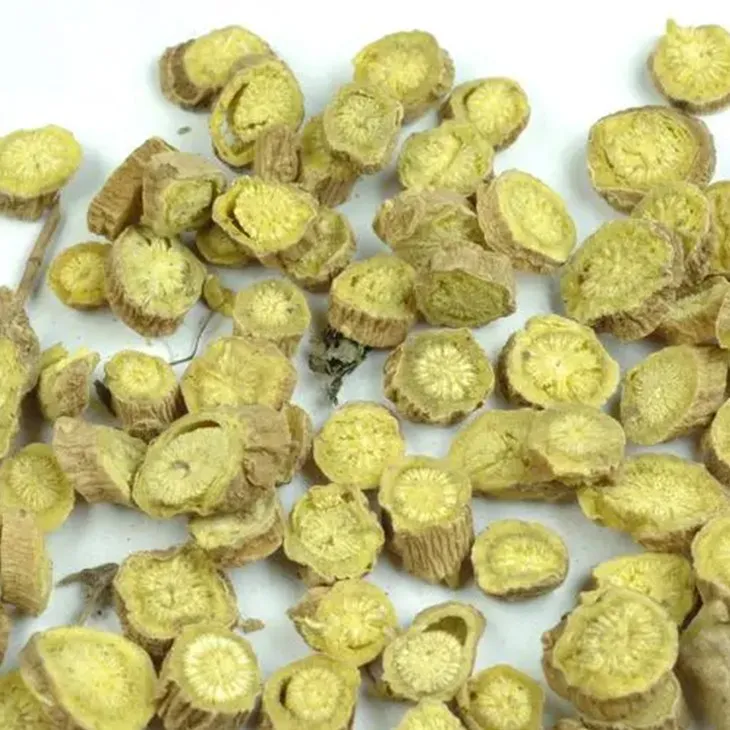- 0086-571-85302990
- sales@greenskybio.com
Organic Baicalin Powder Manufacturers.
2024-11-30

1. Introduction to Organic Baicalin Powder Manufacturers
Manufacturers of organic Baicalin powder play a crucial role in the production of this highly desirable substance. Baicalin, an important bioactive compound, has attracted significant attention because of its potential health benefits and wide - ranging applications across multiple sectors.

2. Ensuring Organic Integrity of Raw Materials
Raw Material Sourcing: Organic baicalin powder manufacturers place great emphasis on the organic integrity of their raw materials. This process often involves collaborating with organic farmers or establishing their own organic cultivation facilities. By doing so, they can ensure that the plants used to extract baicalin are grown without the use of synthetic pesticides, fertilizers, or genetically modified organisms (GMOs).
Quality Control at the Source: The manufacturers also conduct strict quality control measures at the raw material stage. They may test the soil quality, water sources, and the overall health of the plants to ensure that they meet the organic standards. This initial step is vital as it sets the foundation for the production of high - quality organic baicalin powder.

3. The Manufacturing Process
3.1 Extraction Methods
During the manufacturing process, advanced extraction methods are employed. Manufacturers use state - of - the - art technology to extract baicalin from the plant sources. One common method is solvent extraction, where suitable solvents are used to dissolve baicalin from the plant material. However, it is crucial to select solvents that are safe and do not leave harmful residues in the final product.
Another method that is being increasingly explored is supercritical fluid extraction. This technique uses supercritical fluids, such as carbon dioxide, which have properties between those of a gas and a liquid. Supercritical fluid extraction offers several advantages, including high selectivity, low toxicity, and the ability to operate at relatively low temperatures, which helps preserve the integrity of the bioactive compound.
3.2 Quality Monitoring with Advanced Analytical Tools
High - performance liquid chromatography (HPLC) and other advanced analytical tools are used to monitor the quality of the powder. HPLC is a powerful technique that can separate, identify, and quantify the components in a sample. It allows manufacturers to determine the purity of the baicalin powder, ensuring that it meets the required standards.
In addition to HPLC, other techniques such as mass spectrometry may also be used for a more comprehensive analysis. These tools help in detecting any impurities or contaminants in the powder, which could affect its safety and efficacy. By closely monitoring the quality during the manufacturing process, manufacturers can produce a consistent and high - quality product.

4. Packaging Considerations
Packaging is an important aspect of the production process for organic baicalin powder manufacturers. They need to choose materials that can protect the powder from various factors that may degrade its quality.
Moisture Protection: One of the key concerns is moisture. Moisture can cause the powder to clump, and in some cases, it can lead to the growth of mold or other microorganisms. Therefore, manufacturers often choose packaging materials that have a good moisture - barrier property, such as laminated aluminum foil or high - quality plastic films with moisture - resistant coatings.
Light Protection: Light can also have a negative impact on the quality of baicalin powder. Exposure to light, especially ultraviolet (UV) light, can cause chemical reactions in the powder, leading to a decrease in its potency. To prevent this, manufacturers may use opaque packaging materials or packaging with UV - blocking properties.
Oxygen Barrier: Oxygen can cause oxidation of the powder, which may affect its stability and shelf - life. Packaging materials with good oxygen - barrier properties, such as certain types of plastics or composite materials, are used to minimize the exposure of the powder to oxygen.

5. Market Promotion and Education
Organic baicalin powder manufacturers are actively involved in market promotion and education. They recognize the importance of communicating with potential customers, such as pharmaceutical companies, cosmetics manufacturers, and health - conscious consumers, about the benefits and proper uses of their product.
5.1 Marketing to Pharmaceutical Companies
When targeting pharmaceutical companies, manufacturers highlight the potential medicinal properties of baicalin. Baicalin has been studied for its anti - inflammatory, antioxidant, and antibacterial properties, among others. Manufacturers may present scientific research findings to support the use of their organic baicalin powder in the development of new drugs or as an ingredient in existing pharmaceutical formulations.
They also emphasize the quality and purity of their product, which are crucial factors for pharmaceutical applications. Pharmaceutical companies require high - quality raw materials to ensure the safety and efficacy of their products. By demonstrating their commitment to quality control, manufacturers can attract the attention of these companies.
5.2 Marketing to Cosmetics Manufacturers
For cosmetics manufacturers, the focus is on the skin - friendly and antioxidant properties of baicalin. Baicalin can be used in various cosmetic products, such as creams, lotions, and serums, to provide anti - aging, anti - inflammatory, and skin - brightening effects.
Manufacturers of organic baicalin powder promote their product as a natural and organic ingredient, which is increasingly in demand in the cosmetics industry. They may provide samples and technical support to cosmetics manufacturers to help them incorporate baicalin into their product formulations.
5.3 Marketing to Health - Conscious Consumers
When it comes to health - conscious consumers, manufacturers need to communicate in a more consumer - friendly way. They highlight the natural origin and potential health benefits of baicalin powder. For example, they may promote it as a dietary supplement that can support the immune system, reduce inflammation, or improve overall well - being.
Social media and online platforms are often used to reach out to these consumers. Manufacturers may create engaging content, such as blog posts, videos, and infographics, to educate consumers about baicalin and its uses. They also offer product information, including dosage instructions and possible side effects, to ensure that consumers can make informed decisions.
6. Regulatory Compliance
Organic baicalin powder manufacturers must comply with various regulatory requirements. These regulations are in place to ensure the safety, quality, and authenticity of the product.
Organic Certification: In order to label their product as "organic," manufacturers need to obtain the appropriate organic certification. This involves meeting specific criteria set by regulatory bodies regarding the cultivation, processing, and handling of the raw materials. The certification process is often complex and requires regular inspections and documentation.
Quality and Safety Standards: Manufacturers also need to adhere to general quality and safety standards. For example, in the pharmaceutical and food supplement industries, there are strict regulations regarding the purity, potency, and stability of the product. They must ensure that their manufacturing processes are in line with good manufacturing practices (GMP) to prevent contamination and ensure product consistency.
Labeling Requirements: Accurate labeling is another important aspect of regulatory compliance. The label must include information such as the product name, ingredients, net weight, usage instructions, and any relevant warnings. For organic products, it must also clearly indicate the organic status and the certifying body.
7. Future Trends and Challenges
The field of organic baicalin powder manufacturing is constantly evolving, and manufacturers need to be aware of future trends and challenges.
7.1 Trends
- Increasing Demand for Natural and Organic Products: There is a growing trend towards natural and organic products in various industries, including pharmaceuticals, cosmetics, and food supplements. This is driven by consumer awareness of the potential health benefits and environmental sustainability associated with these products. As a result, the demand for organic baicalin powder is expected to increase.
- Advancements in Extraction and Processing Technologies: New extraction and processing technologies are being developed, which may offer more efficient and environmentally friendly ways to produce baicalin powder. For example, the use of enzymatic extraction or green solvents may become more prevalent in the future, reducing the environmental impact of the manufacturing process.
- Expansion into New Markets: As the understanding of baicalin's properties and applications grows, there is potential for manufacturers to expand into new markets. For instance, the use of baicalin in the nutraceutical and functional food industries may increase, opening up new opportunities for sales and growth.
7.2 Challenges
- Raw Material Availability: The availability of high - quality raw materials can be a challenge. The cultivation of plants containing baicalin may be affected by factors such as climate change, pests, and diseases. Manufacturers may need to explore alternative sources of raw materials or invest in sustainable cultivation methods to ensure a stable supply.
- Competition: The market for bioactive compounds is becoming increasingly competitive. There are many other natural compounds vying for a share of the market in the pharmaceutical, cosmetics, and food supplement industries. Manufacturers of organic baicalin powder need to differentiate their products through quality, innovation, and effective marketing strategies.
- Regulatory Changes: Regulatory requirements are subject to change, and manufacturers need to stay updated to ensure compliance. New regulations may be introduced regarding the safety, quality, or labeling of organic baicalin powder, which could require adjustments to their manufacturing processes and marketing strategies.
8. Conclusion
Organic baicalin powder manufacturers are at the forefront of a growing industry. They are responsible for ensuring the quality, safety, and marketability of this important bioactive compound. By focusing on raw material integrity, advanced manufacturing processes, appropriate packaging, market promotion, and regulatory compliance, they can meet the demands of various industries and consumers. However, they also need to be aware of future trends and challenges to stay competitive and sustainable in the long run.
FAQ:
What are the main sources of raw materials for organic baicalin powder manufacturers?
Organic baicalin powder manufacturers mainly source their raw materials either by collaborating with organic farmers or through their own organic cultivation facilities. This ensures the organic integrity of the raw materials used in the production of baicalin powder.
How do manufacturers ensure the quality of organic baicalin powder during the manufacturing process?
During the manufacturing process, they use state - of - the - art technology. High - performance liquid chromatography and other advanced analytical tools are employed to monitor the quality of the powder. This helps in ensuring that the final product meets the required quality standards.
What factors do manufacturers consider when choosing packaging for organic baicalin powder?
Manufacturers choose packaging materials that can protect the powder from moisture, light, and other factors that may degrade its quality. This is crucial to maintain the integrity and effectiveness of the organic baicalin powder.
Who are the main customers of organic baicalin powder manufacturers?
The main customers of organic baicalin powder manufacturers include pharmaceutical companies, cosmetics manufacturers, and health - conscious consumers. These customers are interested in the potential health benefits and applications of baicalin in their respective products or for personal use.
How do organic baicalin powder manufacturers promote their products?
They communicate with potential customers about the benefits and proper uses of organic baicalin powder. Their marketing strategies often include highlighting the organic and high - quality aspects of their products.
Related literature
- Organic Baicalin: Production and Applications"
- "The Role of Baicalin in Modern Medicine: An Overview"
- "Manufacturing Standards for Organic Herbal Powders"
- ▶ Hesperidin
- ▶ Citrus Bioflavonoids
- ▶ Plant Extract
- ▶ lycopene
- ▶ Diosmin
- ▶ Grape seed extract
- ▶ Sea buckthorn Juice Powder
- ▶ Fruit Juice Powder
- ▶ Hops Extract
- ▶ Artichoke Extract
- ▶ Mushroom extract
- ▶ Astaxanthin
- ▶ Green Tea Extract
- ▶ Curcumin
- ▶ Horse Chestnut Extract
- ▶ Other Product
- ▶ Boswellia Serrata Extract
- ▶ Resveratrol
- ▶ Marigold Extract
- ▶ Grape Leaf Extract
- ▶ New Product
- ▶ Aminolevulinic acid
- ▶ Cranberry Extract
- ▶ Red Yeast Rice
- ▶ Red Wine Extract
-
Saponin Extract
2024-11-30
-
Citrus bioflavonoids
2024-11-30
-
Cocoa Extract
2024-11-30
-
Purple Sweet Potato Extract
2024-11-30
-
Tongkat Ali Extract Powder
2024-11-30
-
Red Date Extract
2024-11-30
-
Camu Camu Extract
2024-11-30
-
American Ginseng Root Extract
2024-11-30
-
Yellow Pine Extract
2024-11-30
-
Tinospora cordifolia extract
2024-11-30





















